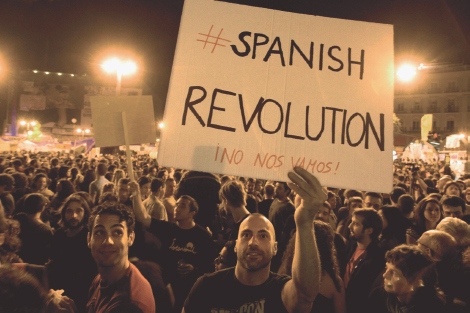Printed Page 283
CONVERGING MEDIA

Case Study
Fragmentation, Polarization, and Convergence
The greatest irony of the emerging Internet-driven media convergence is that it coincides with a period of increasing cultural fragmentation and political polarization in the United States. The same conditions that have enabled the user-generated collective intelligence of the wikis have also facilitated the opposing mobilizations of both the Tea Party and the Occupy Wall Street movements.
With the help of two national conservative organizations, the Tea Party succeeded in using Web resources and online social networks to connect local groups to the national leadership. These well-financed operations trained local Tea Party organizations in using new media and also enlisted the local membership as focus groups to test political messaging. The midterm elections of 2010 saw the defeat of enough Democrats by Tea Party–approved candidates to place the House of Representatives firmly in Republican hands.1
The same technologies augmented a competing movement attempting to shift the political agenda in a different direction. Energized by the digitally augmented revolutions in Tunisia and Egypt, an anti-consumerism Web site in Canada called Adbusters planned, organized, and mobilized the first Occupy Wall Street (OWS) protests on September 17, 2011, in New York City. OWS activism quickly spread to other major cities and has resulted in rising media coverage and political discussion of income inequality, financial accountability, and unemployment.
This convergence of the online and “real” worlds can affect personal lives as well as political movements. Though social media can be terrifically empowering, some users can also become overreliant on them (as is the case with almost any technology). The smartphone, for example, has not only augmented the revolutionary changes of the Arab Spring, but has also enabled the existence of “helicopter” parents who remain overly involved in the daily lives of their children long after they depart home for college. Similarly, Facebook users may feel self-conscious about projecting different, potentially fragmented images to different groups of friends—or finding a single identity that fits all of them. Online identities have begun to feel less virtual, more integrated into our everyday experiences.
Whether the aims are political, personal, or a mixture of the two, Internet users can now find friends, news sources, music, movies, and other media that challenge their thoughts, ideas, and opinions—or reinforce them. This fragmentation combined with the blurring of boundaries between online and “real” identity has the potential to affect behavior throughout the world—for better, for worse, or perhaps both. It also makes the process of becoming media literate more necessary than ever.